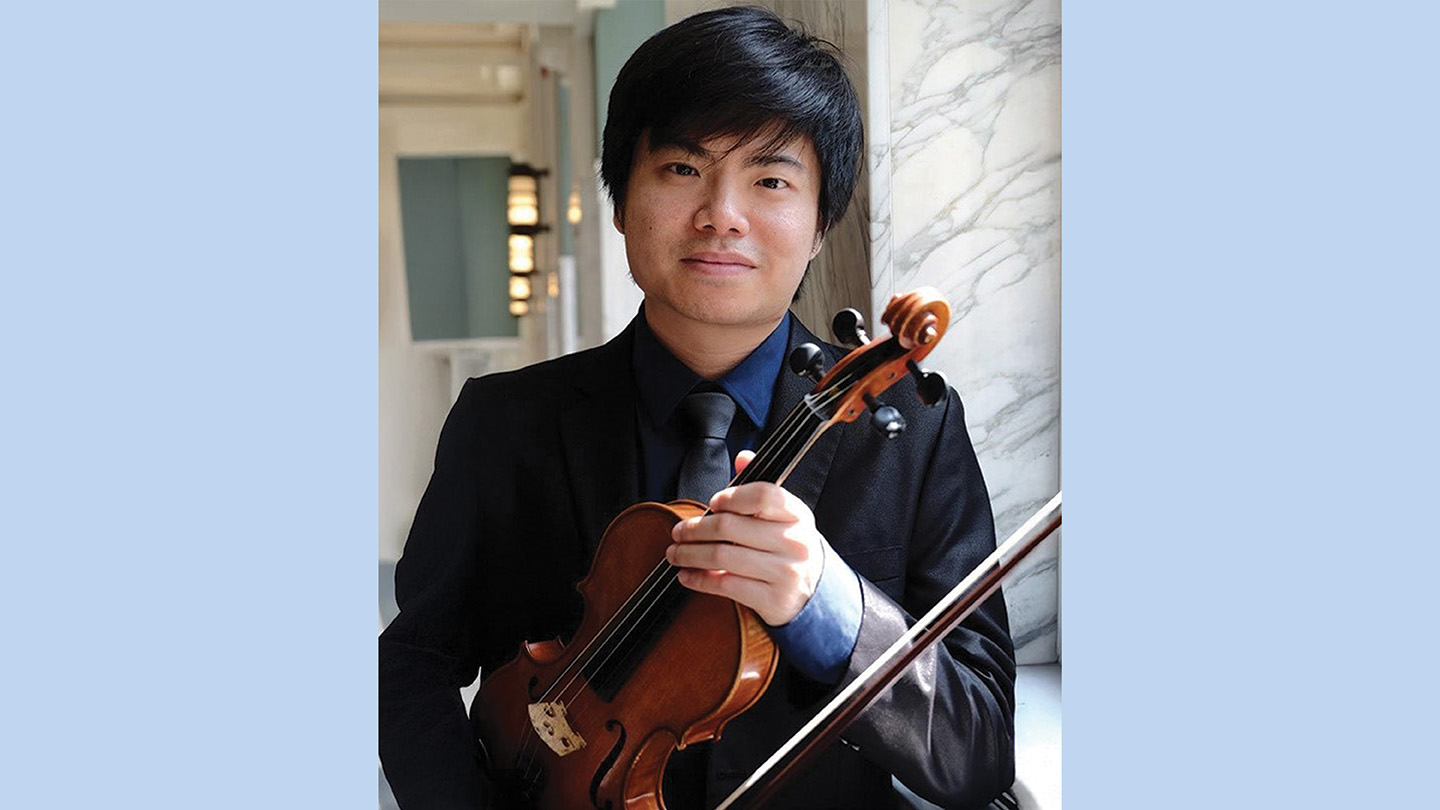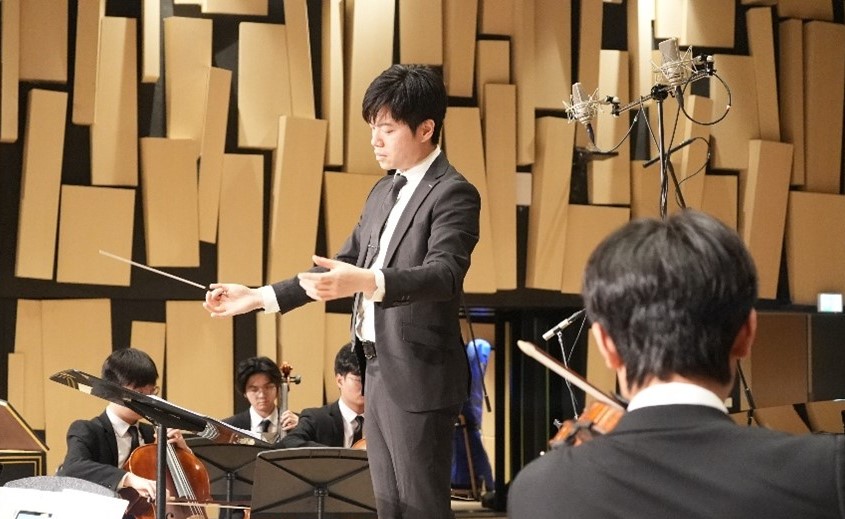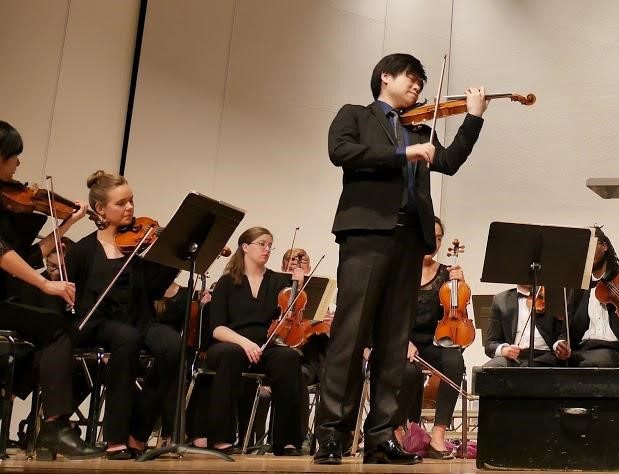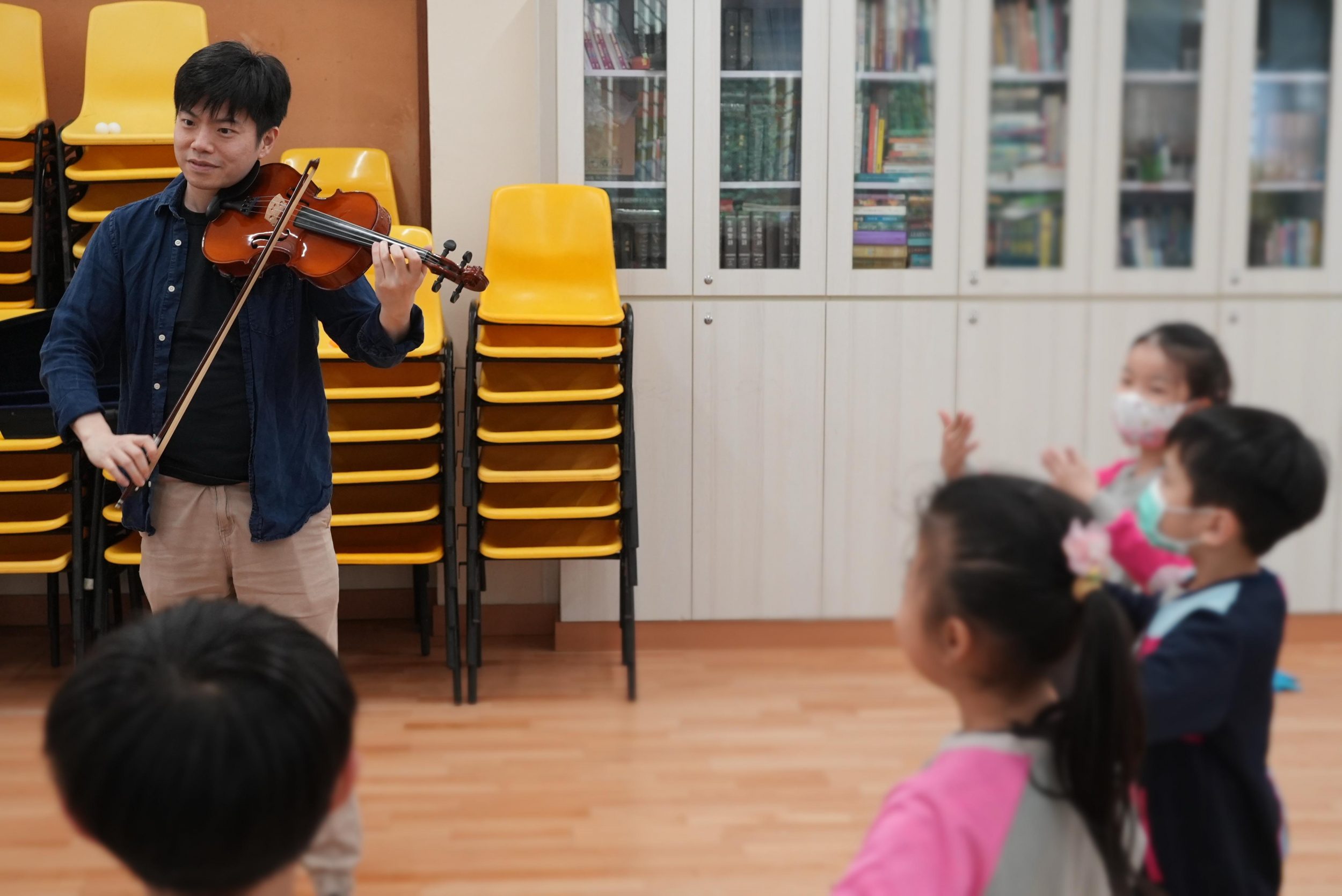People・Discovery
HKBU has nurtured over 168,000 graduates since its inception in 1956 and numerous alumni have in the past made notable achievements in diverse areas and professions. In this connection, we are pleased to introduce alumni from different professions and invite them to share their knowledge discovery with us.
Sharing by Alumnus Dr Samuel Huang Chun-hang
Harnessing the Power of Music for Student’s Growth and Development

Alumnus Dr Samuel Huang Chun-hang
Alumnus Dr Samuel Huang Chun-hang (Music- Performance/Pedagogy) discovered his passion for violin performance during his undergraduate studies and subsequently pursued his career in music performance. He further honed his violin skills at the Hong Kong Academy for Performing Arts. Later, he travelled to the US to advance his studies at Kent State University and University of Missouri-Kansas City (UMKC), where he obtained a master’s degree and a doctoral degree in Musical Arts respectively.
Samuel is an award-winning musician, having won the HKBU Concerto Competition and the UMKC Concerto/Aria Competition. He appeared as a soloist with orchestras such as Collegium Musicum Hong Kong, Pro Arte Orchestra of Hong Kong, Shenzhen Arts School Orchestra, and the Kharkiv Philharmonic Orchestra (Ukraine). Besides solo performances, he served as concertmaster of HKBU Symphony Orchestra, Kent State University Orchestra and UMKC Orchestra etc.
Apart from solo and orchestral performing, Samuel served as the violinist of the NewEar Contemporary Chamber Ensemble in Kansas City for four years, and worked closely with contemporary classical composers such as Jennifer Higdon, Chen Yi, and Zhou Long. He has collaborated with world-class artists in chamber music, including Ida Kavafian, Yekwon Sunwoo, and members of the Miami String Quartet and St. Petersburg String Quartet.
Samuel served as a visiting artist in the US, performing and giving masterclasses at various universities, including Western Illinois University and Fort Hays State University. In 2024, he joined HKBU as a Postdoctoral Research Fellow at the Academy of Music, engaging in the JC Project MuSE. Funded by the Hong Kong Jockey Club Charities Trust, this Project provides school-based music and sports education programmes for underprivileged primary school children, aiming to cultivate their whole person development.

As a Postdoctoral Research Fellow at the Academy of Music at HKBU, Samuel (middle) participates extensively in teaching, conducting research, and planning the curriculum for JC Project MuSE.
1. Please introduce the JC Project MuSE and describe the roles of HKBU and yourself in the Project.
JC Project MuSE is a free, high-quality and tailored music (Mu) and sports (S) education (E) programme to primary school children in the most impoverished areas of Hong Kong. By providing access to quality music and sports education, JC Project MuSE seeks to empower these children, enhancing their self-esteem, social skills, and emotional well-being, while also fostering a sense of community and belonging.
As a Postdoctoral Research Fellow at the Academy of Music at Hong Kong Baptist University (HKBU), my role in JC Project MuSE involves teaching, research, and curriculum planning. I collaborate with fellow educators and musicians to develop a curriculum that is not only musically enriching but also tailored to the unique needs of our students. My experience in performance and pedagogy allows me to bring a diverse range of teaching methods to the programme. Additionally, I am involved in assessing the impact of the programme on the students’ development, ensuring that our teaching approaches are able to achieve the objectives of JC Project MuSE.
HKBU, as the institutional supporter of JC Project MuSE, plays a crucial role by providing resources and expertise in music education. The University’s commitment to community engagement and social responsibility aligns perfectly with the goals of the project, enabling us to reach a wider audience and create a lasting impact on the lives of these children.
2. What are the differences between music performance and teaching? How do your experiences as a performer influence your teaching methods in the JC Project MuSE?
Music performance and teaching are two distinct yet interconnected aspects of a musician’s life. Performance is often about personal expression, technical skill, and the ability to communicate emotions through music. It requires a deep understanding of the music being performed, as well as the ability to engage and connect with an audience. In contrast, teaching focuses on imparting knowledge and skills to others, requiring patience, clarity, and adaptability to meet the diverse needs of students.
My experience as a performer significantly influences my teaching methods in JC Project MuSE. Having performed in various competitions and concerts, I understand the pressures and challenges that come with being on stage. This perspective allows me to create a supportive and encouraging environment for my students, where they feel safe to explore their musical abilities without fear of judgment. Our team believes that performance can stimulate personal growth, encouraging students to share their progress through group performances after each term. By integrating elements of performance into our curriculum, our programme aims to inspire confidence and a sense of accomplishment in our students.

Samuel's past performance experience helps him create a supportive and encouraging learning environment for his students.
3. How do you adapt the teaching approaches from your studies in JC Project MuSE? Can you share some specific examples of how music training has positively affected the underprivileged students you’ve worked with through the Project?
One specific example of how music training has positively affected the lives of underprivileged students is through collaborative group activities. In our classes, we encourage students to learn music or dance together as an ensemble, fostering teamwork and communication skills. For instance, when preparing for the term-end performance, students must listen to one another and support each other’s growth. This collaboration not only enhances their musical abilities but also builds lasting friendships and a sense of community among them.
Additionally, I have observed significant improvements in students’ self-esteem and resilience. Many students come from challenging backgrounds, and music provides them with a constructive outlet for their emotions. During a recent ensemble training, a shy student who rarely spoke in class surprised us all by taking the lead in a group activity. This moment was an example of the transformative power of music; it gave her the confidence to express herself and engage with her peers.
In conclusion, JC Project MuSE is a meaningful initiative that leverages the power of music to bring positive transformation in underprivileged children. My role at HKBU allows me to contribute meaningfully to this project, drawing on my past experiences as a performer and educator to create a nurturing environment for our students to cultivate their interest in music. Through innovative teaching approaches and a focus on holistic development, we aim to make a lasting impact on the lives of these children, helping them discover their potential and find happiness through music.

Samuel observes that the power of music brings significant improvements in students’ self-esteem and resilience.





